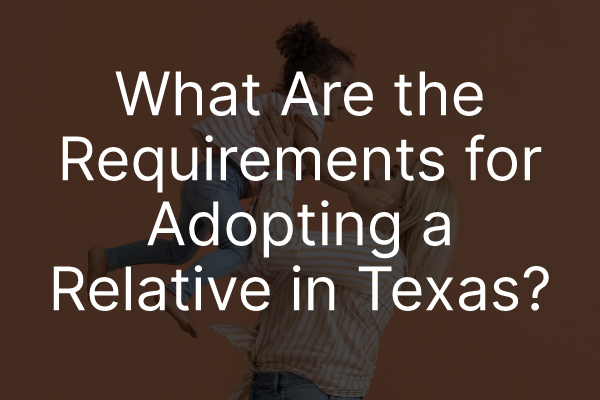How Do Stepparent Adoptions Work?
Stepparents of a child in Texas can file for adoption of the child they share with their spouse. Often, the biological parent will join the case and be considered a co-petitioner.
It is important to fully understand the laws and steps that you need to follow to ensure the adoption is successful. Failing to do so can either delay your case or have it dismissed altogether. Alison Grant, Attorney at Law, is dedicated to helping families reach a happy and successful conclusion of adoption by supporting the biological parent and stepparent through the process. This helps promote a strong, healthy, and unified family unit, setting the child up for success. Here is what you need to know about stepparent adoption cases in the state of Texas.
Who Is Eligible to File a Stepparent Adoption Case?
An adult who is the stepparent of a child younger than the age of 18 is eligible to file for a stepparent adoption case in the State of Texas. The biological parent, the stepparent’s spouse, must join with the stepparent as a co-petitioner in the adoption case as stated in the Texas Family Code 162,001(b)(2).
Where Should I File the Stepparent Adoption Case?
Adoption cases should be filed in the county where either the stepchild resides or the stepparent and spouse reside. Generally, you can file the case at the county or district court in either location. Once you know where to file the case, you can take the following steps to ensure its success.
The first two steps well depend on two factors: first, your relationship with your step child. Second, your relationship with the biological parent who is not your spouse.
The Biological Parent Who Is Not the Spouse Is Still Alive And Has Parental Rights
If the stepchild’s other parent is alive and their parental rights are intact, the first step will be to submit an Original Petition to Terminate the Parent-Child Relationship and for Adoption. This petition is needed to terminate the rights of the other biological parent and can only be approved by a court. However, the termination and adoption case can be heard and decided on at the same court hearing. Talk with your trusted family law attorney for information about what this could mean for your particular case.
The Biological Parent Who Is Not the Spouse Is Deceased or There Was a Court Order That Terminated Their Rights
If the stepchild’s other biological parent is deceased or their parental rights have already been terminated by a court order, you will only need to file an original petition for adoption.
In either case, you will want an experienced family law attorney at your side to help you navigate the process. Adoption can be complicated, so it is important to have an attorney who has experience with similar cases.
What Does it Cost to File an Original Petition of Termination and Adoption or an Original Petition for Adoption?
On submission of a petition of termination and adoption or just for adoption, you’ll need to pay a filing fee. This fee varies by county. If you need specific information about the cost, contact your district clerk’s office or the statutory county court with jurisdiction over family law in your county.
The contact information for the Denton, Texas District Clerk’s Office can be found here.
If you are worried about not being able to pay the fees, you can always ask the judge to waive the fees by completing and filing a Statement of Inability to Afford Payment of Court Costs.
Is There a “Respondent” In a Stepparent Adoption Case?
The respondent is the individual being served the lawsuit. In stepparent adoption cases, the child’s other parent (if they are living and have their parental rights) is considered the respondent in the case, as well as any individual with a court-ordered relationship with the child.
If the respondent agrees to the termination, they will have to sign an “Affidavit of Voluntary Relinquishment of Parental Rights.” This affidavit may make it unnecessary to serve the respondent with the lawsuit.
It is important to note that if the other living parent has already had their rights terminated previously to this case, they will not be listed as a respondent in the adoption case.
Will I Have to Appear in Court?
Yes. If you are going to court for a termination and adoption case, you may have to appear in court. During these proceedings, the court may order an adoption evaluation to review the fitness of the stepparent requesting the termination of the parent-child relationship or adoption.
The court can also appoint an attorney ad litem to represent the child/children of the case. This attorney will ensure that everything is being done in the best interests of the child/children.
Both the petitioners and the child/children, if they are over the age of 12, will need to appear at the adoption hearing. In some cases, it may be difficult for the child to appear before the court. In this case, a petition can be filed to waive the requirement that they appear before the court. However, this has to be in the “best interest” of the child.
Does the Child Have to Consent to the Adoption?
If the child is 12 years or older, they must consent to the adoption in writing or in court. If the child is 10 years or older, the adoption will change the child’s name. Again, the child must consent to the name change in writing.
However, as with appearing before the court, the court may waive this requirement if it serves the best interest of the child.
Does the Child Have to Live With Me Before I Adopt Them?
Texas State law states that a child has to have lived with the petitioner for at least six months before the court may grant an adoption. However, as with the other exceptions, if for whatever reason this requirement does not serve the best interest of the child, it may be waived.
What Gets Decided During a Stepparent Adoption Case?
The following will be decided on by the court concerning the adoption case:
- Whether the other biological parent, who is not the spouse of the stepparent, should have their parental rights terminated.
- Whether any other court-ordered relationship over the child should be terminated.
- Making the adopted child the son or daughter of the stepparent.
- Appointing the remaining parent and stepparent as the conservators of the child.
- Ending the child support obligation of the terminated parent. However, any child support that is still owed must be paid.
- Creating the child’s right to inherit from the stepparent.
- If requested, changing the adopted child’s name.
- Allowing the parents to get the child a new birth certificate by completing the Certificate of Adoption form and giving it to the district clerk.
What Does the Court Look for in Eligibility of Adoption?
Adoption requires the court to ensure the following:
- The child is eligible to be adopted by having the respondent parent’s parental rights terminated.
- The judge finds the requirements for adoption have been satisfied and filed correctly with the court.
- This can include an adoption evaluation.
- The results of the criminal history and background checks are clear for both petitioners.
- There is a signed and verified affidavit concerning the compliance of the Interstate Compact on the Placement of Children.
- Depending on the particular circumstances of your case, the court may look into the following:
- Whether an attorney ad litem, guardian ad litem, or amicus attorney is needed.
- Whether a child evaluation is needed.
- CPS Central Registry Check.
- A certificate from the Texas Paternity Registry to ensure no other man has claimed paternity of the child.
- Finally, the judge has to ensure that the adoption is in the best interest of the child/children.
Don’t Try to Navigate Your Stepparent Adoption Case Alone
Alison Grant, Attorney at Law, is dedicated to ensuring that you and your family have the best chance of success. We understand that every case is different and will work closely with you to ensure your rights are protected and your concerns are heard during your case. Contact our team today for more information on our family law services or to schedule a consultation.








